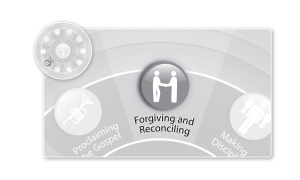Part XIV of the Forgiving and Reconciling Series
 Let’s go back to Les Miserables. The part of the story I shared with you previously is probably the most famous part of the book that relates to forgiveness. But I want to share another part of the Les Miserables story with you now. It’s the part that takes place right before the section I shared.
Let’s go back to Les Miserables. The part of the story I shared with you previously is probably the most famous part of the book that relates to forgiveness. But I want to share another part of the Les Miserables story with you now. It’s the part that takes place right before the section I shared.
Here’s what happens:
Even before Valjean reappears, Monsieur Bienvenu undertakes to forgive him. When he finds out that Valjean has stolen the silver, Bienvenu actually repents personally before God. He recognizes that he has sinned, too: he has withheld his own wealth from the poor. He realizes that God brought this to his attention through Valjean’s theft. So he repents—he receives Christ’s judgment on himself without protest, and he turns away from his sin and toward the mercy of Christ. And then he knows he must pass on to Valjean the forgiveness—the being-set-free, the setting-right, the delivery from bondage—that he himself received. Christ’s forgiveness of Bienvenu creates new space for Bienvenu himself to act toward Valjean.
But here’s the key point: Bienvenu doesn’t do this as a strategy to get Valjean to change. That’s God’s job. God’s job is to change the human heart. Bienvenu’s job—and our job—is simply to offer to others what God has given us, including (and especially) his forgiveness.
So Valjean may or may not be drawn to repent in the space Bienvenu creates; Bienvenue doesn’t know. But what’s interesting is how Bienvenu’s forgiveness of Valjean in Jesus’ name – which mirrors God’s own forgiveness – confronts Bienvenu’s maid, Madame Magloire, with the generosity of Monsieur Bienvenu’s God, who is revealed through the bishop to be a very generous God indeed.
Madame Magloire says:
“Monseigneur, the man has gone! The silver is stolen!”
While she was uttering this exclamation her eyes fell on an angle of the garden where she saw traces of an escalade. A capstone on the wall had been thrown down.
“See, there is where he got out; he jumped into Cochefilet lane. The abominable fellow! He has stolen our silver!”
The Bishop was silent for a moment, then raising his serious eyes, he said mildly to Madame Magloire:
“Now first, did this silver belong to us?”
Madame Magloire did not answer; after a moment the Bishop continued:
“Madame Magloire: I have for a long time wrongfully withheld this silver; it belonged to the poor. Who was this man? A poor man evidently.”
“Alas! Alas!” returned Madame Magloire. “It is not on my account or Mademoiselle’s; it is all the same to us. But it is on yours, Monseigneur. What is Monsieur going to eat from now?”
The Bishop looked at her with amazement:
“How so! Have we no tin plates?”
Madame Magloire shrugged her shoulders.
“Tin smells.”
“Well, then, iron plates.”
Madame Magloire made an expressive gesture.
“Iron tastes.”
“Well,” said the Bishop, “then, wooden plates.”
Monsieur Bienvenu willingly bears within himself the penalty of Valjean’s sin, for Christ’s sake: he is willing to eat on tin plates or wooden plates. He insists that he himself is also a thief, like Valjean, because he (Bienvenu) has withheld the money from the poor, against the commands of Christ. His acceptance of Christ’s judgment and mercy colors the way he looks at Valjean. He does not judge him by just rendering a verdict—“You are a thief.” He judges him with the judgment of Christ, which means he shares with him the same release from bondage that he himself received—“You are a sinner, as am I. Just as my master bore the penalty of my sin in himself, so also he bears the penalty of your sin through me.”
There is therefore now no condemnation for those who are in Christ Jesus.
But we may feel tempted to say, “Yes, but the one who sinned against me sinned in a way I have not. He is a much worse sinner than me.” Is that so? Well then, remember that to the one whom much is given, much is expected. If you are not a worse sinner, are you an especially profitable servant? If you don’t forgive in Jesus’ name those who sin against you, you most certainly are not.
And this brings us all the way back around to the question about Jesus’ words in Luke 17:3, where Jesus says, “If your brother or sister sins against you, rebuke them; and if they repent, forgive them.” That sure sounds like repentance follows forgiveness.
In our next post, you’ll find out why that’s not the case.











Pingback: Forgiving Those Who Trespass Against You, Part 3 | Rev. Eric Foley